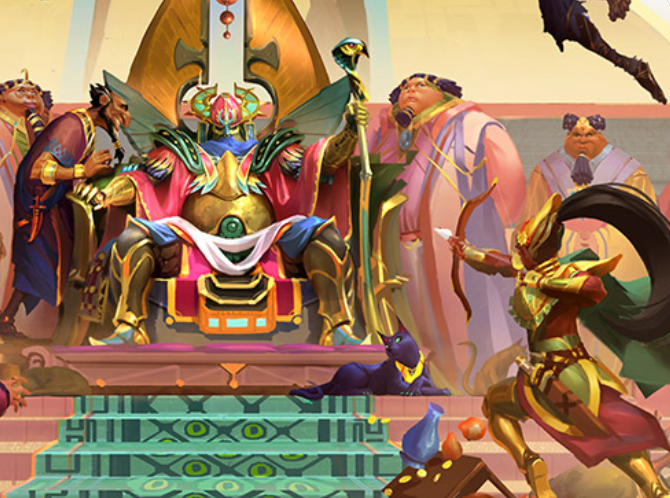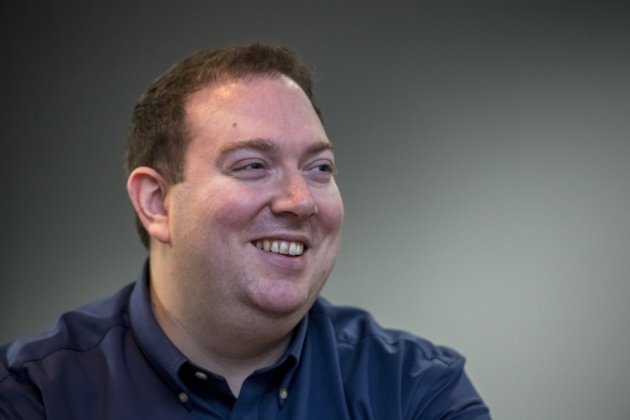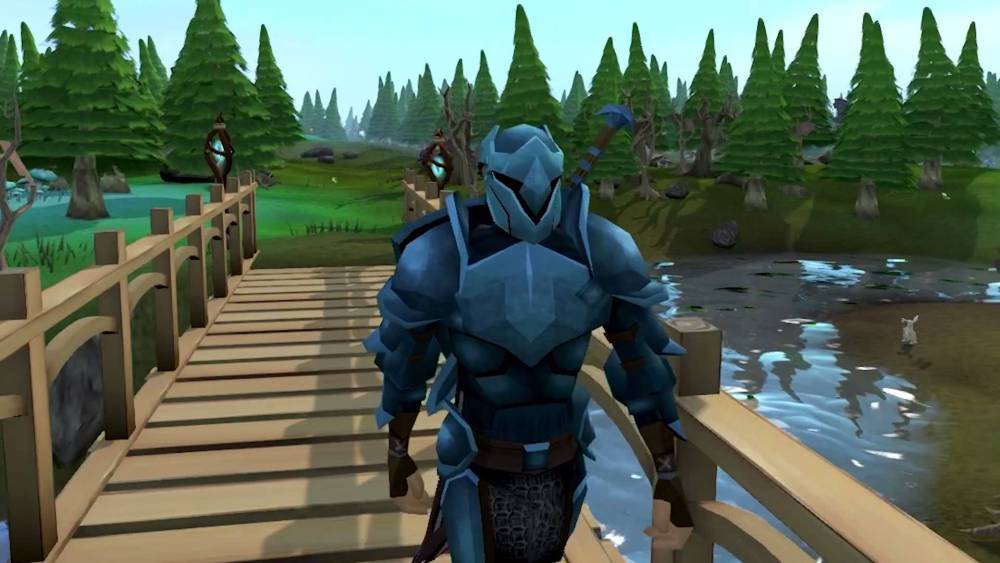
UK developer Jagex is best known for the hugely popular MMO Runescape. Now, as it sets its sights ahead to more of its own service-based games, the Cambridge-based studio is also looking to take on more of a publisher role with key developer partnerships. Its publishing label, Jagex Partners, was announced shortly before Gamescom this year, where it was met with much interest from the European development community.
The key selling point for Jagex Partners is the studio’s storied history with online games, along with the experience that it has gained over the years and its focus on what it calls “living games,” which are the epitome of games-as-a-service: titles with lengthy shelf lives, that evolve over time and keep a passionate, committed player base coming back time and time again.
One does not simply launch a publishing arm, however. Jagex Partners has been a while in the making.
“We were in stealth mode for a while,” says Jagex CEO Phil Mansell. “But having now got to the point where we’ve got a business plan, we know how much to spend over how much time. More importantly, we’ve got our core team and we understand what we need from the technology. Everything’s in place. Gamescom was the perfect time to get the word out and really start talking in detail and meeting more partners.

“We took about 15 people to Gamescom and all of them had full diaries for the whole event, so it went very well. When I think about our press releases and the website we set up, you can never be sure what information gets across. What I’ve been most pleased about is how we had people come up to us at Gamescom and at the various parties outside who have heard the news. But it’s not just, ‘Oh, Jagex Partners, you’re doing third-party publishing,’ it’s that they’ve also understood and got the message that we’re specializing in live games. They connect that to our heritage. It makes sense fundamentally and they can see a need for it — if not themselves, because they’re in a different space, then for others. I’ve been really happy… that it’s made intuitive sense.”
Everything Mansell told us fed into a key theme for the endeavour. The name Jagex Partners was carefully chosen, as each deal struck with developers is intended to be a lengthy commitment and a two-way street. A proper partnership, where Jagex can take advantage of their specialist skills during the development process and beyond. Not simply a quick route to market.
“It’s very important to have a good relationship with the developer,” explains Mansell. “If you’re doing very long life games, you’re almost like partners in a marriage. That has to be healthy.
“There’s going to be constructive friction, there’s going to be disagreements, but you need to work well as a team and both sides must help constructively and add value to each other over that long period. So the game is obviously the most important thing. But the relationship, the camaraderie and the constructive work partnership, you can’t work without that.
“We are developers ourselves. We know what that entails. We need to have a very sympathetic working style. But it also means we know that if you’re a developer with a strong vision and you you’ve got a strength of product that we want to work with, then we don’t want to tell people how to make their own game, right? It’s more for us to help and add value in the publishing areas where we’ve got particular skill. Having done it with our games for many years and having got the cuts and bruises as well as the victories that come with that. We can provide that expertise as well as things like funding, things like infrastructure and technology… Those learnings over so many years.
“You also learn how to learn. Players change, technology changes, trends across internet gaming change. So we’re always ready for that and we’re not taken by surprise when new things happen. We’ve become very good at adapting. And that’s also a mindset and a way of operating that we can bring to partners.”
With so many companies looking to get into the publishing side of the business, things are starting to get a little cramped. On the one hand, it means that indie developers have a lot of choice when trying to get their games signed. On the other, it means there’s a lot of variation between what publishers in the market can offer. It also means some unwary developers might accidentally find themselves in a losing deal if they’re not careful. Thankfully, Jagex’s focus on living games makes it very clear that they’re interested in mutual benefit and that developers with single-player projects need not apply.
“We are looking for games that are already going to be multiplayer,” Mansell says. “Generally these will be in the core games multi-platform space, although PC is generally our home and most of these types of games start out there. So that would be a requirement for us. If there’s a single-player game that’s out and it’s looking to add multiplayer, maybe there’s an interesting discussion but there’s probably more of an outlying opportunity. There are very competent indie and premium game publishers. And we’re not trying to compete with them. They do a great job.
“We also believe that launching a live game, a living game, is different from a premium game. That itself needs to be managed differently. So picking up games that have been out for a long time, we’ll probably talk to people [and] there there might be an opportunity, but I think it’s probably secondary to our core purpose of helping people finish building, launch and then sustain and globalize their products.”
The range of areas in which Jagex can help with online multiplayer title development, marketing and support are as numerous as they are deep. Many are linked to community and audience retention — keeping players happy by understanding and communicating with them.
“If you’re trying to launch a game that doesn’t necessarily charge upfront, or maybe it does but then it has a sustainable revenue on it afterwards, you need that community to be sticking with you. You need to be thinking of all the different channels you’re going to be talking with players.
“An obvious example is: If you’re launching a premium game, for the most part your ongoing relationship with the players is not unimportant, but it’s not of primary importance. Getting that initial sale, getting that brand imprint is really important. For us, if players are coming back month after month, year after year, they’re going to continue to refer the game to their friends. They want to continue to pay for whatever services are within the game. You need to be able to contact them. You want them to stay in touch with you.
“There’s a whole load of techniques about building up relationships. Whether that’s social media, whether that’s having contact details, operating customer relationship management platforms, knowing what to engage, how to segment your audience, how to engage different portions of that audience with different offers, gameplay content and messaging. That’s quite a different way of working if you’ve only been doing premium digital retail-orientated publishing. So that’s just one of the many, many areas of specialist difference that we’ve had to master ourselves. That’s part of what we can offer others.”
Jagex’s in-house community managers have certainly seen their fair share of the cuts and bruises that Mansell mentioned earlier. Gamers can be tricksy. But for living games, developing relationships with them is absolutely vital. The CMs at Jagex are some of the best in the business and well worth emulating for the studio’s partners.
“We’ve got great community managers,” Mansell says. “They are fans of the games. They are a conduit of information and they can explain things better to the players. They can take that information back inside the studio, they are massively part of both our in-game events events and live events. They’re kind of like the standard bearers for it, but the army behind them is the rest of the volunteer force we have as well as our staff.
“We have now 180 of our staff active on Twitter, having relationships and making connections with players, talking about the minute details of that game feature they’re making. The players love that stuff and our devs love the conversation that comes with it. So to do that without a good sense of how to do community management well and the standard bearers of great CMs helping is hard, but it’s something we have the experience in.”

It helps that Jagex has impressive sentiment tracking for all of its users. If its audience gets grumpy, it won’t be long until the studio is on the move to try and fix the problem.
“What we used to do was monthly surveys to players to measure various things but it can be hard to get people to take part,” Mansell explains. “If it’s on email, will they answer the email? Can they be bothered? It can take five minutes to fill out a web form. So we put it in the game now, it’s a thumbs up or thumbs down system. The sophistication often comes not from their input of up or down, but you can then analyze the data like who’s saying what and why, as well as how that’s changing over time. We can see literally hour-by-hour sentiment in the game.
“So if we’ve launched something really well, players are behind it and loving it and getting involved. As they change servers or log out they get to give us that stamp of approval or not. And let’s say we messed something up, we’ve miscommunicated something or we’ve launched something that’s got one too many bugs. We fix them within the hour, but you can see, ‘Ooh, we’ve had a bit of a notch in customer satisfaction.’ But we know we turned it back around and hotfixed it in an hour, it’s back is normal. That level of very responsive fine grain customer satisfaction measurement, you don’t see that many places.”
Jagex wants to keep the volume of partnerships small at first, simply because of how closely they’ll be working together. Sign too many deals and that specialist team will be spread too thin to work its magic. But the studio is already looking ahead to beyond the next couple of years. That means games early in development now are well placed for interested developers to start having that conversation with Jagex. Though ideally the fun will already be demonstrable. Jagex is in a position to pick and choose its favorite, most promising projects. It’s an enviable place to be.
Ultimately it will be that relationship between the teams that determines whether the partnership is viable, however. This will be determined over a courting period before that marriage proposal can be made.
So with Jagex looking so far forward into the future of live and living games, where does Mansell see innovation in the space coming? In short, cross-play. But perhaps not the kind you’re immediately thinking about.
“I’ve talked about this before, like a year ago,” Mansell says. “Crossplay is going to be a big thing. Interoperability between PC and mobile. People were like, ‘Well maybe, let’s see. Core games on mobile, let’s see what happens.’ We’ve had Fortnite since then! Now everyone’s talking about it.
“I really think that as the games market gets more competitive it’s going to cost more to make games and to acquire users. The hunt for loyal users is heating up and up and up. And I think one of the ways that manifests is more lifestyle convenience, even within core games. What we’re doing with Runescape I hope will show that you can do cross-platform core games and it really works. Though it depends on the execution. We’re quite lucky our games lend themselves to touch screen, but even shooters which arguably aren’t naturally touch screen. They still do well and Fortnite smashed it. So I think even with a bit of crunching the game down it can still work pretty well.
“There was a period five or six years going around the iPad coming out when you went to E3 or at Gamescom and everyone had a tablet companion app. You can drive around a little UAV drone while your friends are shooting beneath you. We all saw that and it seemed fun but actually it was really hard to make and the players didn’t really give a shit. I think what you offer has to be genuinely compelling and meaningfully worth doing. Does that have to be completely interoperable and identical gameplay? Probably mostly, but not entirely. I think you’ll see over the next five years a lot of experimentation on exactly that point. I think even when we’re looking at our next generation games and we’re thinking it’s going to be PC and console primarily, what’s the window into that game on mobile? Is it a direct port? We’re still talking about that. We haven’t made a decision.
“But as we’re talking about these ideas I do believe there are ways of capturing that experience, sharing in the world and the character without needing to cram every controller button onto the touchscreen of a mobile. I think more and more creative design solutions are going to be discovered in the next few years. We’ll be a part of that and I think if we look back in five or 10 years there’ll be a whole new body of design skill around how to do that.”
 GameDaily.biz © 2025 | All Rights Reserved.
GameDaily.biz © 2025 | All Rights Reserved.